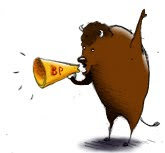- "I don't believe in mission creep," he continued. "Had we gone into Baghdad -- we could have done it, you guys could have done it, you could have been there in 48 hours -- and then what? "Which sergeant, which private, whose life would be at stake in perhaps a fruitless hunt in an urban guerilla war to find the most-secure dictator in the world? "Whose life would be on my hands as the commander-in-chief because I, unilaterally, went beyond the international law, went beyond the stated mission, and said we're going to show our macho?" he asked. "We're going into Baghdad. We're going to be an occupying power -- America in an Arab land -- with no allies at our side. It would have been disastrous." Bush said, "We don't gain the size of our victory by how many innocent kids running away -- even though they're bad guys -- that we can slaughter. ... We're American soldiers; we don't do business that way." "Am I happy that S.O.B. is still there?" Bush asked, then answered, "No." Bush said his memory of Vietnam influenced his thinking during the Gulf War. He recalled that politicians during the Vietnam War kept changing the conditions under which U.S. forces fought -- bombing halts and cease-fires. (TORA BORA?) He said his view was different, and it was a view that was backed up by the secretary of defense and military leaders. "Let the politicians do their diplomacy -- and we worked hard to bring about a peaceful solution. We didn't want any man or woman put into harm's way," Bush said. "We worked hard to form an international coalition," he explained, calling it historic in originality, diversity. "But once the military mission had been defined and the fighting begun, I thought we ought to get the hell out of the way and let the military fight the war and win, and that's exactly what you did. And God bless you for doing it," he said, gesturing to retired Gen. Frederick M. Franks Jr., who commanded VII Corps during Desert Storm. Bush said the United States learned in World War II -- and learned it again before Operation Desert Storm -- that you can't appease an aggressor. "And had we gone for Saddam's ploys, had we capitulated to those advocating a more-passive course, had we relied totally on sanctions ... then we would have sent a signal of weakness to other would-be aggressors around the world," he said. "But we didn't do that," he continued. "We were clear in our purpose from the start. And just for the record, we gave peace a chance. Between August and the time you had to go into battle, we gave it a chance. "Once it was clear that our diplomacy had failed, that U.N. resolutions would not work, that Saddam had no interest in peace ... we did what we had to do -- no more, no less." "We said this aggression would not stand," he said, adding that the soldiers kept his word. "Three times when I was president, I was called upon to make a decision that only the president can make, and it's the toughest decision any president can make ... when you're going to send somebody else's kid into harm's way." He said that, perhaps because of his own service in the military, the decision was never easy. He said it should never be easy for any commander-in-chief. "The decision to go to war is one that defines a nation to the world, and perhaps more importantly, to itself." He said that he knows he called on "all branches of our military to do some extraordinary things, but not once was I let down or was the country let down." At the time of the collapse of the Soviet Union, he said, he was apprehensive that there was a lot that could go wrong with the situation in Central and Eastern Europe rapidly became more fluid. That, fortunately, did not happen, he said, and the confrontation -- the Cold War -- ended without a shot being fired. Returning to the issue of Hussein's longevity, Bush jokingly called it "a sore spot with me" to be "out of work while Saddam Hussein still has a job. It's not fair," he asserted. Still however, "he is no threat to invade another sovereign nation, and pillage its culture, and murder its citizens. He can brutalize his own people, and torment and torture them, but he can no longer pose a threat to his neighbors. And that's just one of the benefits" of Desert Storm. "As a result of that historic victory, we also saw American credibility go up. You all did this," he said, gesturing to the assemblage. Bush recalled Russian Prime Minister Mikhail Gorbachev calling him the second day of the bombings requesting a bombing halt. "'We have an arrangement with Saddam Hussein that he will leave the sands of Kuwait,' he said. "We didn't need to consult," Bush explained. "I watched with horror bombing pauses of Vietnam when everybody kind of reinforced their positions, and our soldiers were the losers," Bush said. "I said we don't need a bombing pause. He knows how he got in there -- all he's got to do is put his weapons down and walk out. Of course he wasn't prepared to do that at all," Bush said. "In only a few times in America," Bush said, "does history present us the direct opportunity to shape the world we live in. And we can be proud that when our moment came eight years ago, we were ready.
9/16/2004
Would that the apple fell closer to the tree
I sure wish Junior would call up his old man once in a while. He just might learn a thing or two.
Here's what Poppy Bush had to say in 1998 to a gathering of Desert Storm vets:
Subscribe to:
Post Comments (Atom)



No comments:
Post a Comment